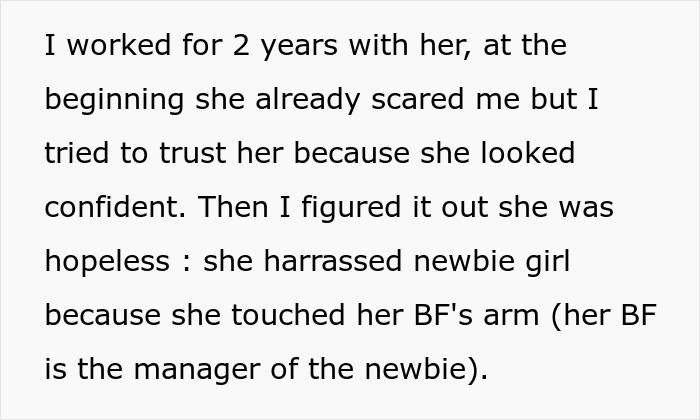Sometimes bosses and managers get so used to the modicum of power assigned to their role that they forget that they aren’t immune from the schemes of “regular” folk. After all, people love and have loved revenge stories for a very long time for very good reasons, even if modern versions are rarely as dramatic.
A light technician shared their bit of petty revenge after getting sick and tired of a draconic event manager harassing their coworkers. We reached out to the netizen who shared the story via private message and will update the article when they get back to us.
Horrible managers tend to drive employees away

Image credits: Kevin Schmid/Unslplash(not the actual photo)
But one light technician decided to put on a show on their way out





Image credits: kues1/Unsplash (not the actual photo) (not the actual photo)





Image credits: Vitaly Gariev/Unsplash (not the actual photo)





Image credits: Getty Images/Freepik (not the actual photo)




Image credits: No_Ad5144
People do love stories about misbehaving people getting punished for it

Image credits: Curated Lifestyle/Unsplash (not the actual photo)
People enjoy revenge stories because they tap into a very primal part of human nature: the desire for justice when all other avenues have failed. These stories often feature an underdog who’s been wronged, humiliated, or overlooked, and who rises up to reclaim power in dramatic, sometimes poetic fashion. Revenge narratives provide a kind of emotional catharsis. They let readers or viewers live out a fantasy of control in a world that often feels unfair. There’s a unique satisfaction in watching a character who’s suffered in silence finally outwit or overpower their oppressor, especially when it’s done cleverly, with a twist, or in a way that feels well-deserved.
Another reason revenge stories resonate is because they deal with imbalance. Someone is mistreated, and instead of turning the other cheek, they set the scales straight. In real life, many people feel like they have to swallow injustice because the stakes are too high to fight back. Revenge stories break that rule and offer a window into what it might feel like to take the gloves off and stop playing nice. It’s not always about violence or destruction, sometimes the best revenge is success, exposure, or making someone irrelevant. Regardless of the method, the allure comes from watching someone reclaim dignity and control.
From John Wick to The Count of Monte Cristo, people have enjoyed these sorts of stories for a very long time. The Iliad contains multiple different instances of revenge as well. It’s a pretty core part of our storytelling. Naturally, we enjoy stories when, on some level, we can relate to them, so what better “modern” villain than an annoying manager.
Getting back at an annoying boss or manager is a pretty common part of “workplace revenge”

Image credits: Getty Images/Unsplash (not the actual photo)
This is why revenge against horrible bosses, in particular, is such a popular theme. Most people have worked a job where they felt disrespected, underpaid, overlooked, or straight-up mistreated by someone in power. Bad bosses are an almost universal experience, whether it’s the micromanager, the credit-stealer, or the emotionally immature tyrant. But in the real world, employees often can’t retaliate without risking their livelihood. So when people read about someone standing up to a nightmare boss, or better yet, outsmarting them, it scratches a very specific itch.
These stories are even more engaging when the revenge is clever rather than cruel. Think quitting with flair, exposing toxic behavior to higher-ups, getting poached by a rival company and taking half the staff with you, or succeeding wildly after being told you’d never make it. That blend of pettiness and justice is incredibly satisfying because it feels like a win for everyone who’s ever had to smile through a performance review with someone they despised.
There’s also a communal element to reading or watching these tales. People share them in group chats, online forums, or at work with the kind of gleeful whisper you’d reserve for gossip. Why? Because it’s validating. It reassures them that they weren’t overreacting, that yes, some bosses really are that bad, and no, they’re not alone in wishing for a moment of sweet, sweet payback. Whether it’s quitting on the spot after years of disrespect or watching a horrible manager face consequences in public, these stories are popular because they blend justice, rebellion, and a touch of fantasy in a way real life rarely allows.
Some readers found the plan hilarious










Others shared similar stories


 Follow Us
Follow Us





